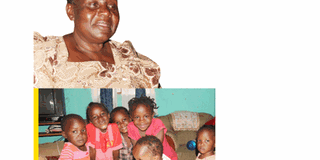She makes a home for children who have nowhere else to go

Superimposed photos depicting Nakimbugwe with some of the children she looks after. They all look healthy and well cared for. Photo by Abubaker Lubowa.
What you need to know:
She started out looking after her relatives’ children who needed her help in her early 20s and went on to pick up more needy children along the way. In her 50s today, this kind soul still runs a house full of children, even if she does not have much.
Next to the door to Florence Nakimbugwe’s home in Kiira Namungongo is a hole in the cemented verandah and the broken floor tiles are visible as you enter the living room.
When I arrive, I’m welcomed by a teenage girl in a red blouse and blue skirt, who ushers me into the living room with a worn out brown sofa set.
I sit at the edge of the sofa partly because I want my body language to communicate interest in Florence’s story but also because I’m not comfortable sitting there since the chair is a bit sunken.
Alone in the room, as I wait to meet the old lady who looks after children, I gaze around the room in search for toddlers’ toys.
There are neither toys nor children, just a big Cathode Ray Tube (CRT) television and a few petite white and red stripped school uniforms in another chair.
Within a few minutes, Nakimbugwe enters the room dressed in a brown gomesi. She welcomes me in Luganda seemingly glad to finally meet the person she has been communicating with on the phone.
She is about five feet tall, friendly, has short slightly grayed hair and with barely any wrinkles to show for her 55 years of age.
As I had suspected on the phone, she is not one to be rushed. In a soft-spoken manner, she takes her time to narrate her journey of taking care of children.
Collecting the children
“I have always loved and taken care of children for as long as I remember. I think it is a God-given passion. I started by taking care of relative’s children in 1980. By 1983, I had taken on more needy children,” she says.
With a smile, she changes topic to talk about some of the children she has raised: “Some of my children are taxi drivers, hair dressers and others work in UMEME.”
Nakimbugwe brought her children into her marital home and says, “My late husband also took care of some of the children. He too did not show favouritism between our five biological children and the rest I was raising.”
Her husband died 10 years ago, but Nakimbugwe remains grateful that he left her the home in which she still raises children. “I raise my children with a sense of togetherness and do not discriminate amongst them,” she says as she calls on one of the children, four-year-old Flora to confirm this.
Once Flora joins us in the interview, one by one, a smiling child joins us.
Most of the girls’ hair is plaited and except for flu, each one of them looks healthy and happy.
Three of the little girls push to Nakimbugwe who holds them close. At this point in the interview, Nakimbugwe has referred to the children she raises as “my children” over 20 times, demonstrating her immense love for them.
At present, she takes care of 14 children, some of whose school fees is paid for by sponsors and well-wishers. Apart from some locals in her area, some of the companies, which have helped her with donations along the way include: NTV, Pride Micro Finance and Face Technologies.
In fact, we learnt about Nakimbugwe from Face Technologies, which recently donated clothes, food stuff, beddings, scholastic materials and school fees worth Shs1,500,000.
Today, Nakimbugwe wishes to get a bigger house to raise the children in. Since the law has changed since the 80s, she is in the process of obtaining a licence that officially allows her to look after the children. “I would also like to get some work.
At the moment, I get money from renting out five small one roomed houses my husband left me.
“My last wish is to buy a plot of land even if it is a quarter an acre, for me and my children to be buried there. If one of the children I have raised passed on today, they would have nowhere to be buried,” she says, hopeful that if God does not reward her directly for this act, then He will return the favour to her children.




